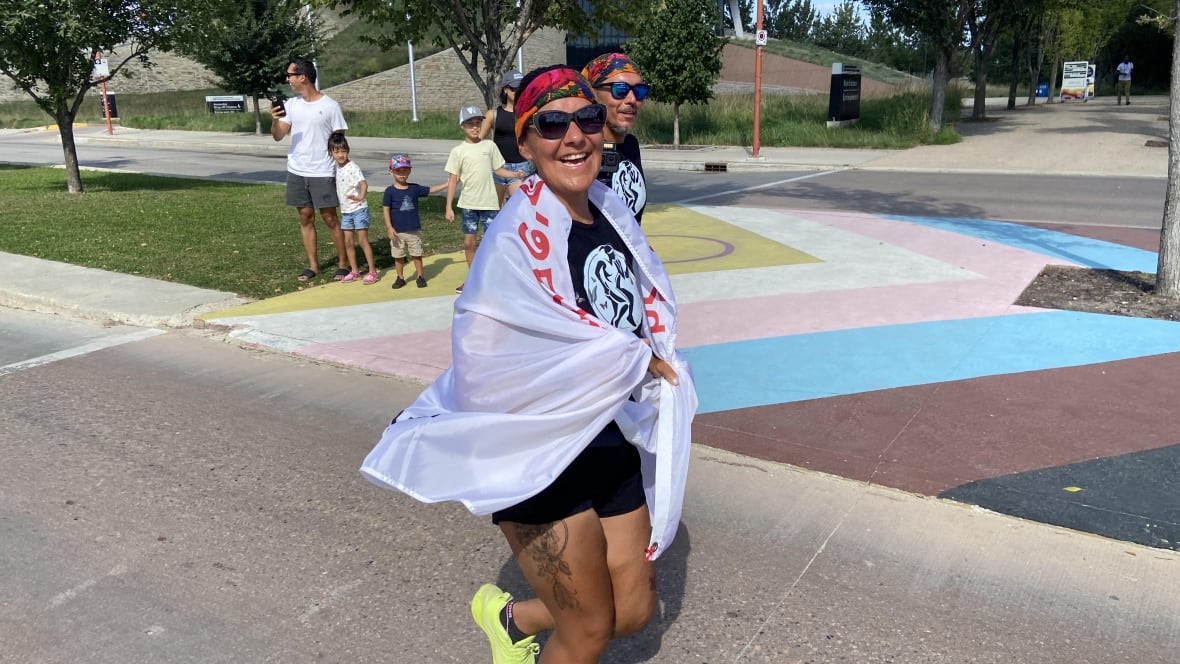Top Stories
Sayisi Dene Woman Completes 800-Km Trek for Addiction Awareness

UPDATE: A remarkable journey for addiction awareness concluded today as Samantha Powderhorn, a member of the Sayisi Dene First Nation, arrived at The Forks in Winnipeg after an arduous 15-day trek covering nearly 800 kilometers. Powderhorn, alongside her partner Luther Alexander from Pine Creek First Nation, was welcomed by a vibrant crowd, marking a significant moment on International Overdose Awareness Day.
This urgent trek highlights the critical gaps in addiction and mental health services affecting remote northern First Nations. The pair undertook this journey as part of their H.O.P.E. movement, which stands for Healing Overcomes Past Experiences. Powderhorn expressed her commitment to inspire others on their healing journeys, stating, “When I was highly addicted, I was ashamed of who I was… I’m proud to say who I am now.”
As they approached The Forks, a line of drummers played, creating a powerful atmosphere that celebrated their achievements. Manitoba Keewatinowi Okimakanak Grand Chief Garrison Settee acknowledged Powderhorn’s “warrior’s spirit” and the message she carries for northern communities. Leaders from various First Nations, including those from Tadoule Lake and Pine Creek, joined the celebration.
During the arrival ceremony, community members honored Powderhorn and Alexander with a cleansing cedar wash for their feet, which had carried them across hundreds of kilometers. They were also gifted star blankets, symbolizing respect and recognition. The emotional impact of the event resonated deeply, as Powderhorn noted, “It’s very important that we reconnect. When we reconnect, we allow ourselves to start our healing journey.”
The H.O.P.E. movement aims to draw attention to Call to Action No. 21 from the Truth and Reconciliation Commission, advocating for sustainable funding for Indigenous healing centers and mental health supports. Alexander emphasized the urgent need for action, stating, “There is a humanitarian crisis up north, and it’s mental health and addictions that are the root cause of many of these situations.”
Today’s event not only marks the end of a grueling journey but also represents a call to action for communities across the nation. The message is clear: hope is alive, and healing is possible. As Powderhorn and Alexander continue to advocate for change, their story serves as an inspiration to many.
The next steps involve raising awareness and mobilizing support for the H.O.P.E. movement, ensuring that the conversation around addiction and mental health remains at the forefront. With ongoing efforts, both leaders and community members are committed to making a lasting impact in the lives of those affected by addiction.
For those interested in supporting this cause or learning more about the H.O.P.E. movement, follow local updates and initiatives aimed at bridging the gaps in services for the communities in need.
-

 Politics4 weeks ago
Politics4 weeks agoSecwepemc First Nation Seeks Aboriginal Title Over Kamloops Area
-

 World5 months ago
World5 months agoScientists Unearth Ancient Antarctic Ice to Unlock Climate Secrets
-

 Entertainment5 months ago
Entertainment5 months agoTrump and McCormick to Announce $70 Billion Energy Investments
-

 Science5 months ago
Science5 months agoFour Astronauts Return to Earth After International Space Station Mission
-

 Lifestyle5 months ago
Lifestyle5 months agoTransLink Launches Food Truck Program to Boost Revenue in Vancouver
-

 Technology3 months ago
Technology3 months agoApple Notes Enhances Functionality with Markdown Support in macOS 26
-

 Lifestyle3 months ago
Lifestyle3 months agoManitoba’s Burger Champion Shines Again Amid Dining Innovations
-

 Top Stories2 months ago
Top Stories2 months agoUrgent Update: Fatal Crash on Highway 99 Claims Life of Pitt Meadows Man
-

 Politics4 months ago
Politics4 months agoUkrainian Tennis Star Elina Svitolina Faces Death Threats Online
-

 Sports5 months ago
Sports5 months agoSearch Underway for Missing Hunter Amid Hokkaido Bear Emergency
-

 Politics5 months ago
Politics5 months agoCarney Engages First Nations Leaders at Development Law Summit
-

 Technology5 months ago
Technology5 months agoFrosthaven Launches Early Access on July 31, 2025





















